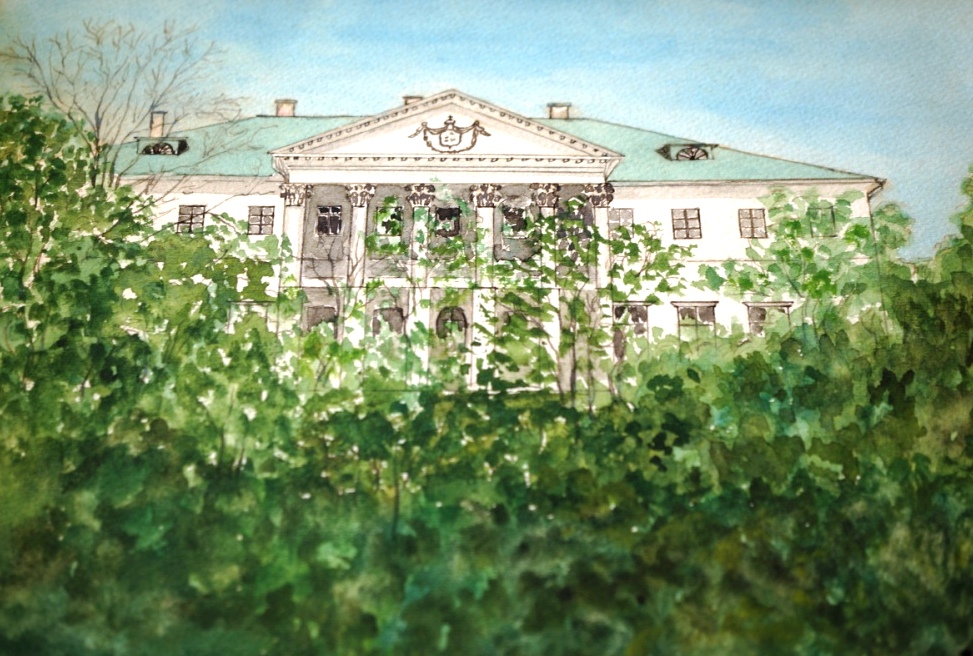 When my grandparents fled the Russian revolution, one of the two servants who came with them was their cook, Katya. She lived with them in Harbin, Manchuria, and then Seattle, and after they were gone, she stayed with my Tyotya (Aunt) Marina in the family house in Los Angeles, until she died in 1966. She never learned English, but fifty years on, she was remembered by a neighbor on their street in Hollywood as the little lady in black often seen sweeping the porch. She looked like the quintessential Russian baba, scarf tied tightly at the nape of her neck, sensible flat shoes and thick stockings, always an apron. And she cooked like an angel, having learned from one of the Tsar’s chefs. My mother would swoon in remembrance of her roast duckling and red cabbage (never replicated), and everyone still groans in delight when we make her piroshki.
When my grandparents fled the Russian revolution, one of the two servants who came with them was their cook, Katya. She lived with them in Harbin, Manchuria, and then Seattle, and after they were gone, she stayed with my Tyotya (Aunt) Marina in the family house in Los Angeles, until she died in 1966. She never learned English, but fifty years on, she was remembered by a neighbor on their street in Hollywood as the little lady in black often seen sweeping the porch. She looked like the quintessential Russian baba, scarf tied tightly at the nape of her neck, sensible flat shoes and thick stockings, always an apron. And she cooked like an angel, having learned from one of the Tsar’s chefs. My mother would swoon in remembrance of her roast duckling and red cabbage (never replicated), and everyone still groans in delight when we make her piroshki.
Tyotya Ma thus had a built in teacher, although her own cooking was legendary not so much for magnificent tours de force, but rather for its delicious simplicity. She could elevate even a simple hot dog to something special to a 7-year old who spooned it up happily at the big round table in the corner of the kitchen.
She had a gift for making dinner seem effortless. The kitchen somehow remained calm and spotless while at table one spread salted mushrooms in sour cream onto toast, and downed bowls of fragrant pelmeni, the Siberian relative of wontons. She continued to turn out these beautiful meal memories for all of us well into her nineties.
I often think of her life, how impossible it would have been for the little girl sitting next to her Swiss governess in the gazebo, called the “Chinese pavilion!” on the family estate in 1911, to imagine that 7 years later, she would be traveling across Siberia in a cramped boxcar, with her mother and siblings, all thoughts of dances and parties and friends lost to mere survival. Finding small pleasures in life in Manchuria while waiting and hoping for her father to join them from the vain battle of the White Army. Leaving her mother (albeit briefly) to begin life over again in a new country, making a family, creating a home, which she did with such extraordinary grace.
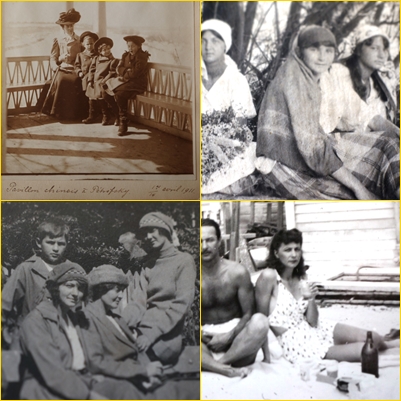
top left – outside moscow, 1911; top right – mushrooming in harbin, about 1921; bottom left – leaving manchuria for the u.s., 1923; bottom right – young married life on the west coast
On the day — 09.09.00 – that my cousin Nina, her granddaughter, called to say that Tyotya Ma had had a stroke at home in the early morning, and we should come soon, we certainly weren’t thinking about eating. There’s a palpable energy around dying that is undeniable, so that all who are present enter into a state of mind, and body, that is quite different from the day to day. We gathered, cousins and two close family friends, to hold vigil. A hospice nurse visited to ensure that Aunt Marina was as comfortable as possible. She slept on the living room couch, and we sat with her, or murmured in the kitchen about the things that would need doing, after, and snuck cigarettes on the rickety back stairs to the garden, in thrall to that strange energy of a soul on its way.
But the day wore on, and we, the living, got hungry. So we poked around in the fridge, pulled out the old hand grinder, bolted it to the edge of the table, and passed a couple of chicken breasts through, finishing up, as Aunt Marina had showed us, with a bit of stale bread, which needed to be added to the bowl anyway, and would clean the last bit of meat from the blades. A very little bit more softened bread, some grated onion, and dill. Shaped into oval patties and dipped briefly in flour or breadcrumbs. Browned in butter in the pan. We had a few mushrooms, and sautéed those, finishing off with some smetana (or sour cream), to sauce the kotlety, although they are fine on their own, too.
It may seem strange in the telling, but it was the most normal thing that we should set her lovely dining room table with a cloth and the good china and silver, and sit together, icons and family photos on the walls behind us, with a glass of wine and crispy, juicy, pristine chicken kotlety, like those that she had served us so many times, while we recalled family history, toasting our beloved Tyotya Ma, who, even as she was slowly departing, still presided over us.
Memory eternal!
Recipe – Chicken Kotlety
Ingredients:
1.5 lbs chicken breasts, boned, skin removed, or 1 lb ground chicken
1 small onion
1-2 slices stale bread, preferably white, crust removed
Dill, chopped, about 1-2 Tbsp
A little milk or water
Salt and pepper to taste (1 tsp approximately of salt is probably a good measure)
Flour or dry breadcrumbs, about ½ cup
3-4 T butter, cold
Butter (about 2 Tbsp) and oil (3-4 Tbsp) for frying
For sauce (optional):
8 oz brown mushrooms
2 Tbsp butter
¼ cup sour cream
Milk to thin
Pinch each of nutmeg and paprika or cayenne
Salt and pepper to taste
Process:
It is really best to use chicken breast rather than already ground chicken. If you can have the breast ground by your butcher, do so. Or proceed as follows.
If you don’t have a meat grinder, break all of the stale bread into pieces and soak in a small bowl with a small amount of milk or water (you will discard the liquid later).
If you have a meat grinder, keep a portion of the bread back (don’t soak) and proceed as above with the rest.
Cut the breast into pieces and pass it through the fine blades twice. Finish with the reserved bread to push all the meat out of the grinder and clean the blades.
Grate the onion finely. Mince the dill. Squeeze the liquid out of the bread.
Mix the ground meat, grated onion, minced herbs and softened bread together well. Season with salt and pepper.
Cut the butter into tiny bits (I shave off bits with the tip of a knife) and sprinkle over the meat mixture. Fold in gently.
(Food processor method. The above can be done in a food processor if you don’t have other ways to obtain ground chicken. Process the onion first, then add the chicken cut into 1-inch pieces and pulse briefly to mince. Add the softened bread and dill and pulse again to combine. The mixture should be fine but not pasty. Add the butter as above and finish mixing by hand to ensure all the ingredients are combined well.)
Form into small oval patties, about 2.5 inches long and about ½ inch thick.
Put the flour or breadcrumbs into a shallow dish and turn each patty once to coat lightly. Put them on a plate covered with plastic wrap or parchment so they don’t stick. If you have time, chill for 30 minutes to 1 hour.
Sauce:
Wash the mushrooms and slice them thinly.
In a medium saucepan, heat the butter and add the sliced mushrooms. Add paprika or cayenne, nutmeg, salt and pepper. Cook until the water has evaporated and the mushrooms have browned slightly, stirring occasionally. Just before serving, put the pan over low heat and stir in the sour cream. Then add a small amount of milk just to thin the sauce enough to spoon out.
Heat the remaining butter and oil in a saucepan over medium high heat. Add the patties without crowding (you may need to do two batches) and fry till golden, about 3-5 minutes on each side. Don’t overcook!
Serve with sauce. Good with boiled or mashed potatoes.

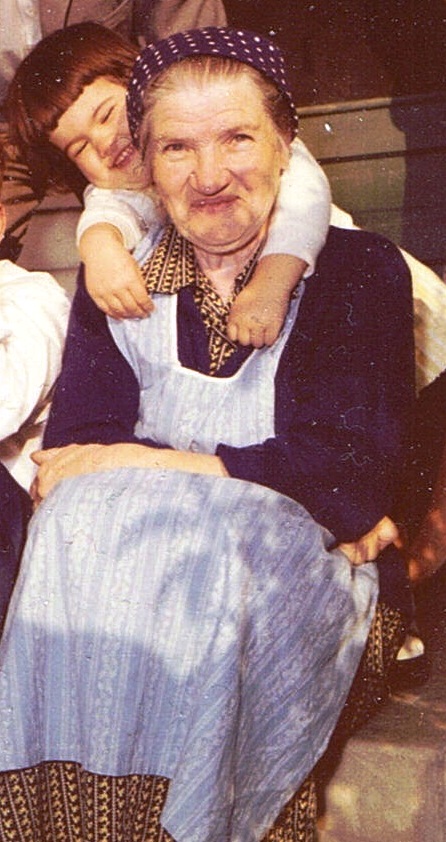

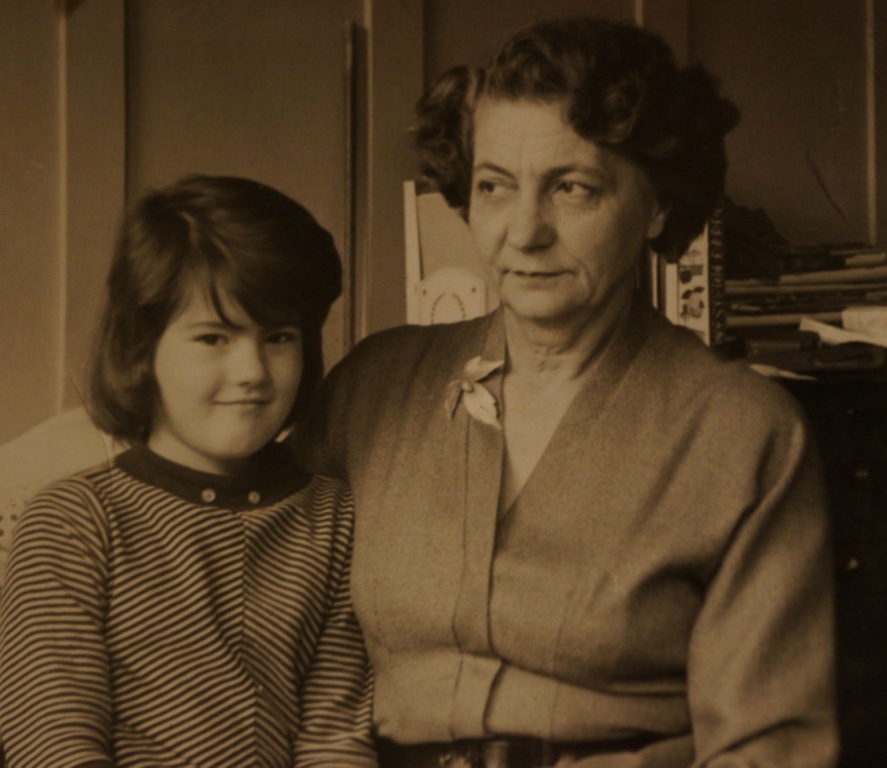
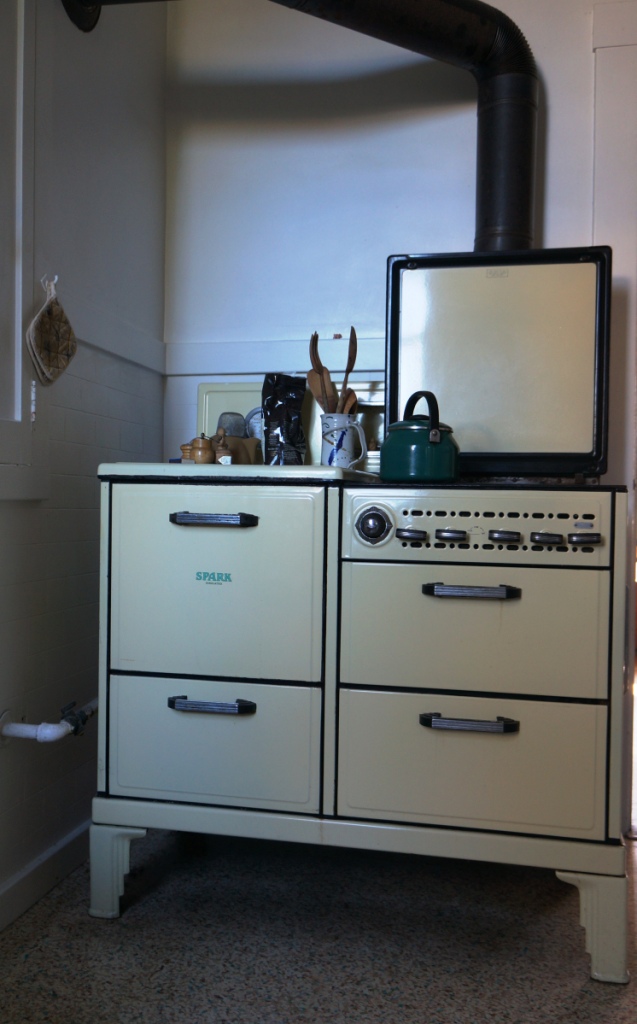
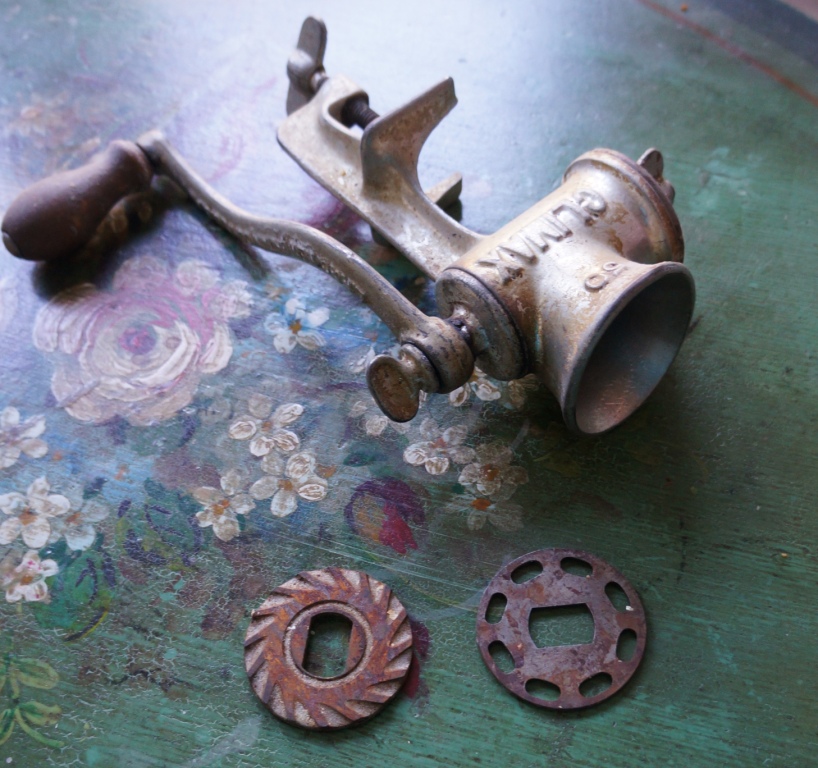



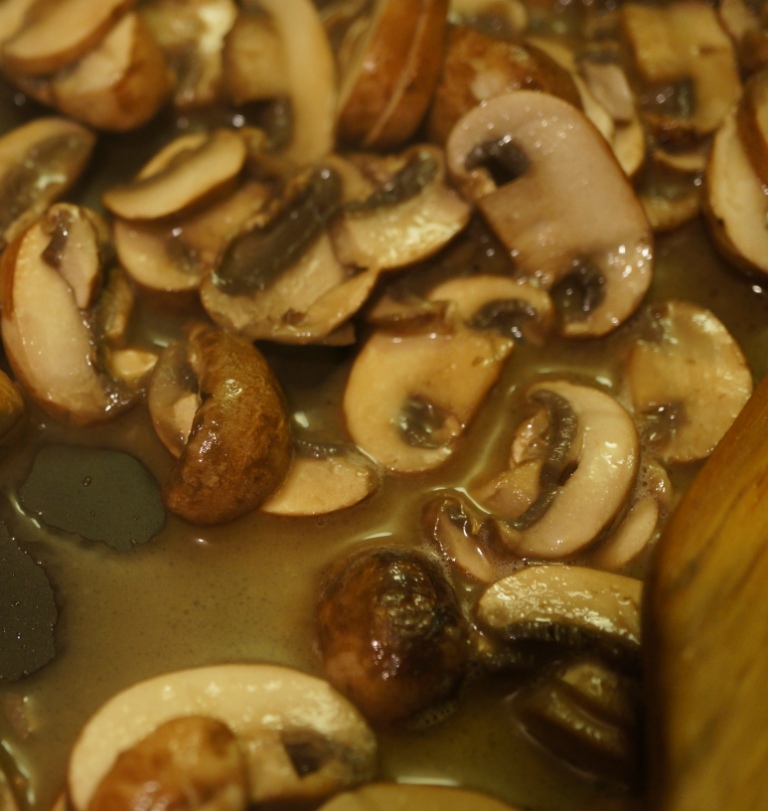

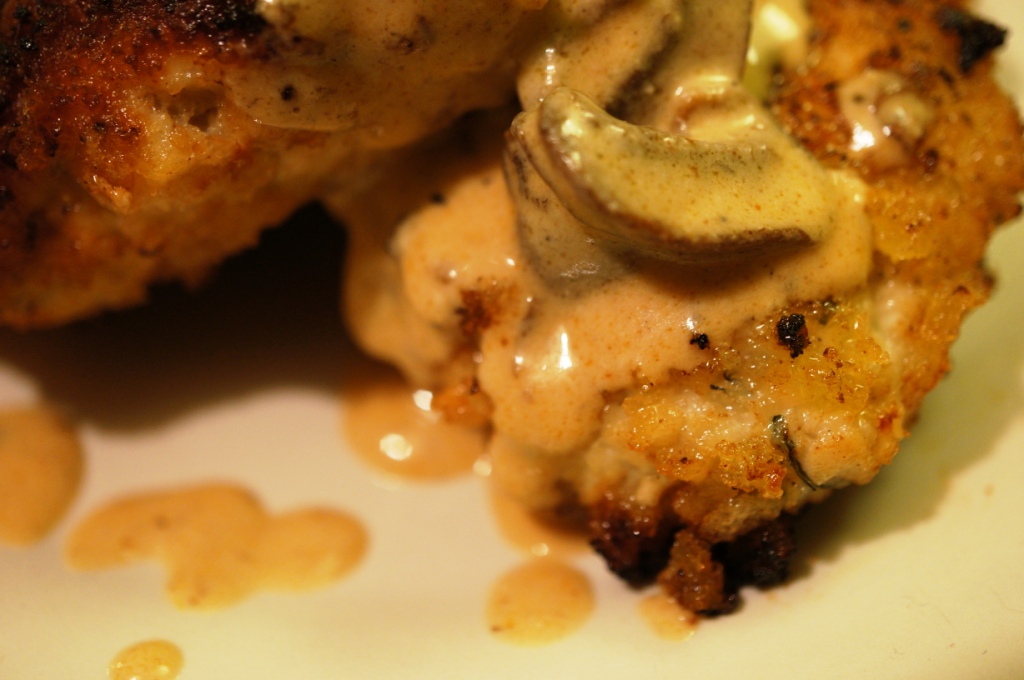
C’est delicat et tres sympa de voyager avec les souvenirs de ces déportations, les sacs remplis de délices que l’on refait au nom de la mémoire.
je me réjouis de manger tes chiken cotlet, c’est un menu que j’ai pris une fois assis au wagon retaurant du fameux train en Inde qui fais Dehli Kolkata, le droit de s’assoir consistait à se tennir derriere la chaise de quelqu’un, d’attendre qu’une nouvelle gare arrive pour que la personne assise prenne ta place et toi la sienne et ainsi de suite pendant 6h Bien entendu, à chaque coup, le serveur avec son turban éventail venait pour savoir qu’elle commande tu allais faire, ne rien prendre aurait été de casser le jeu qui réunissait 2 passager une chaise et un serveur.
La cotelet était servie avec un chatney de tomates qui resemblait à du ketchup casi introuvable à l’époque. Peut être vraiment plus de chili…
Yes! The grace with which some women build and rebuild their lives, wherever The One takes them. Much like yourself, dear. I am so glad you are writing! I love learning more about you through these stories.
LOVELY! I love that Spark vintage kitchen, that quintessential hand-painted flower table-top and her lovely press. So beautiful. And the dish is simple, mashaAllah. Heaven really runs through a woman’s hands 🙂 Love your blog and keep adding more. Been quite a while 🙂 Wonder what’s next 🙂
a wonderful Blog, dear Katherin, very touching, creative and full of grace …
Lovely , good food pics…
glad you liked the blog!
thanks, nalan!
thanks for the encouragement!
merci beaucoup pour cette belle histoire aussi!
gracias!